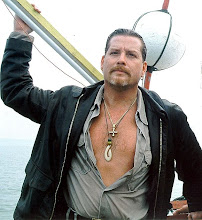Vince and the Magic Fat Body Weight Formula
An excellent question, my young Apprentice!
At one time - at my youngest, prettiest and most fit - I measured just under 6' 1". My God, I was an Adonis!
After back surgery - a discectomy and a laminectomy, ie; blown-out herniated disc material removed - and a lifetime of falling on my head, when I was measured this spring for my MAX VO2 and Hydrostatic body fat test, I was found to be almost an inch shorter!
So I am now only six feet tall. According to the last Post, my ideal weight as a six foot man is 176.
My ideal
marathon weight
would be
25 1/2 pounds
lighter!
If you can do the math, I'd have to weigh
150 1/2 pounds!
My good friend Michael - the genius German Engineer - has calculated that my MAX VO2 at 180 would be around 67-68 - even at age 45 (after all, it was 57 at 203 pounds and 22% body fat) and based on a maximum heart rate of 205.
At 176 pounds it - my MAX VO2 - will be close to 70.
Interestingly enough, if I weighed 150 pounds, my MAX VO2 would be somewhere around 80!
Back to the last post and it's fascinating calculations and formula for athletic success.
At 6'1", weight 178, age 28, my best 10K time was 36:10.
But, and this is a BIG, BIG BUT, in elementary school, High School and University, I always competed as a pure sprinter, and my 100 metres was ALWAYS better than my 200 metres. I also did the long jump and triple jump, both explosive, fast-twitch muscle fibre events.
And according to the formula, a six foot man as an ideal sprinter should be 2 1/2 % or 4 pounds lighter.
In my late teens and early twenties, at 6'1", in my best shape my weight hovered around the low 170's. The lowest I EVER got in my twenties was 168 - and if I knew then what I know now, I would have stayed there. Because, damn, at that weight, I was FAST!
I also got into weight-lifting and knew a lot of body-builders - and no I never did get on the juice. My highest "fit weight" was 222 pounds at about 8 1/2 % body fat. To maintain that weight I had to work out in the gym twice a day, six days a week and consume about 6,000 calories per day.
I have no idea what my MAX VO2 was at that time, but I ran the Seawall in Stanley Park in Vancouver, five or six days a week. My quickest times were around 42 minutes when I was really pushing it. I considered an "average" good run to be around 48 - 50 minutes.
At age 34 I had a fitness assessment that put my body fat at 14% at a weight of 202 pounds and my MAX VO2 was 64.6.
One of my marathoning idols is Derek "Deke" Clayton. At 6'2" and 168 pounds he was considered to have a body fat percentage of around 7%. Nowhere close to what is considered ideal for a "typical" marathoner. In addition to his height and size handicap, Clayton never registered a better MAX VO2 rating than 72, much like Frank Shorter, by the way. And Shorter was just a gold medal Olympian in the marathon...
But Deke Clayton set the world-record for the fastest marathon time not once, but twice! And two and a half years apart! We are talking about a man who ran a 2:08 marathon over a quarter of a century ago. And that is why Clayton is known and revered as the "monster marathoner".
The rest of us can take hope...


1 Comments:
Vince,
I don't know the formula used for extrapolating VO2max, but feel necessary to remind you that as you become smaller, you lose both muscle mass and blood volume. I'm not sure of the nuances, but think this would tend to make any sort of linear extrapolation of VO2max tend to run high. It's nice to figure you'd go to 80, but the truth is likely at least somewhat different.
Post a Comment
<< Home